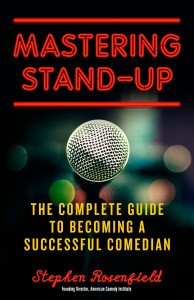 In Mastering Stand-Up: The Complete Guide to Becoming a Successful Comedian, author Stephen Rosenfield shares how to become a professional stand-up comedian and kiss your day job good-bye. Mastering Stand-Up provides a 12-item “Successful Comedian’s To-Do List” and includes 40 sharply written chapters for both beginners breaking into comedy and professionals seeking to improve their sets and advance their careers.
In Mastering Stand-Up: The Complete Guide to Becoming a Successful Comedian, author Stephen Rosenfield shares how to become a professional stand-up comedian and kiss your day job good-bye. Mastering Stand-Up provides a 12-item “Successful Comedian’s To-Do List” and includes 40 sharply written chapters for both beginners breaking into comedy and professionals seeking to improve their sets and advance their careers.
Stephen Rosenfield is regarded as a pioneer in the field of teaching comedy and founded the American Comedy Institute, the premier stand-up comedy school in the United States, in 1989. His alumni include some of today’s most prominent comedians and comedy writers, such as Lena Dunham, Jim Gaffigan, Eric Slovin and Jessica Kirson.
Below, Stephen Rosenfield lays out “The Successful Comedian’s To-Do List.”
1. Find Your Originality. Get in touch with what is original
about your sense of humor. Originality is a hallmark of exceptional
art. In comedy, it’s what the entertainment industry
looks for first and foremost when determining who has the
makings for the big leagues.
2. Master the Techniques of Stand-Up Comedy Writing.
What you need to do now is capture the funny things you say and
think by writing them down. Once you get your spontaneous
comic creations on paper, you can start to apply the writing
techniques that will transform your ad-libs into stage-worthy
stand-up comedy material.
3. Master the Techniques of Stand-Up Comedy Performing.
A stand-up, like an actor, must have the ability to produce onstage
the emotions that give life to his performance. He must be capable of
creating this emotional life night after night, in a way that seems
spontaneous and unrehearsed to the audience.
4. Create Your Comic Persona. To become a successful comedian,
you must develop a vivid and distinctive onstage personality—
a personality as individual as your real-life personality,
only more so.
5. Deepen Your Understanding of Comedy. Gifted stand-ups’
versatility comes from the knowledge and experience they acquire
about comedy during their formative years in stand-up.
6. Study Great Comedians. Watching great comedians will
help you learn and improve your act. You’re not going to know what’s
possible to accomplish in your stand-up unless you know the
work of the great comedians who came before you.
7. Perform! Perform! Perform! Perform stand-up
as frequently as you can. The only way you’ll absorb the techniques
you learn from this book is to use them onstage over
and over again until they’ve become second nature to you.
8. Never Blame Your Audience. Your audience can be an
invaluable guide to improving your writing and performing.
Over time, they’ll teach you what subjects and attitudes work best for you.
Just as important, they’ll teach you what doesn’t work for you.
9. Know the Forms of Stand-Up Comedy. As in all art, standup
has classical forms. Knowing them will help you define
and clarify the type of stand-up you want to do. Knowledge
of the forms will expand and give shape to your comic ideas.
10. Understand the Business. To work as a stand-up, you need
to be knowledgeable about the comedy business. There have
never been more opportunities for comedians and comedy
writers than there are now. I intend for you not only to do stand-up,
but also to be paid to do stand-up.
11. Trust Your Nerves. It’s OK to be nervous. Your nerves can
give you invaluable assistance onstage.
12. Have Fun. Stand-up is the one endeavor I know of where
having fun is actually a requirement. And it’s a requirement
for this reason: when individuals become an audience, a transformation
takes place. They stop feeling what each of them is
feeling individually, and they start to feel collectively what the
performer is feeling.
“My dream was to be a stand-up comedian, but I never thought I could do it. Steve’s class was exactly what I needed. Steve helped me get over my fears. He taught me the techniques I needed to learn and, most importantly, he taught me to be genuine off-stage. He is a brilliant writer and an amazing teacher.” —Jessica Kirson, comedian
No Comments
No comments yet.